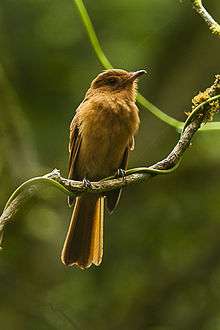Rufous mourner
The rufous mourner (Rhytipterna holerythra) is a small passerine bird in the tyrant flycatcher family. It breeds from southwestern Mexico to northwestern Ecuador. It was formerly believed to be a cotinga, but well-supported anatomical evidence has shown it to be related to tyrant flycatchers of the genera Myiarchus, Sirystes and Casiornis.[2]
| Rufous mourner | |
|---|---|
 | |
| Scientific classification | |
| Kingdom: | Animalia |
| Phylum: | Chordata |
| Class: | Aves |
| Order: | Passeriformes |
| Family: | Tyrannidae |
| Genus: | Rhytipterna |
| Species: | R. holerythra |
| Binomial name | |
| Rhytipterna holerythra | |
The rufous mourner is 20 cm (7.9 in) long and weighs 40 g (1.4 oz). Its plumage is entirely rufous, brighter on the underparts, and with darker brown wings. The base of the bill is pink or horn-coloured. The call is a drawling way teeer and the song is wee hi hi weeur-weeur-weeur.
This bird is found in lowlands and foothills up to 1,200 m (3,900 ft) altitude in wet forests, adjacent old second growth, semi-open areas and shady plantations. The rufous mourner is seen alone, in family groups or as part of a mixed-species feeding flock. It perches on a twig from which it sallies forth to catch large insects and caterpillars and many seeds and fruit.[3] Usually, the food is taken in flight.
It nests in tree cavities, especially old woodpecker holes. It may also nest in holes in earth banks.[2]
Footnotes
- BirdLife International (2012). "Rhytipterna holerythra". IUCN Red List of Threatened Species. 2012. Retrieved 26 November 2013.CS1 maint: ref=harv (link)
- Scholes (2004)
- E.g. of gumbo-limbo (Bursera simaruba), and less frequently from Cymbopetalum mayanum (Annonaceae): Foster (2007)
References
- Foster, Mercedes S. (2007): The potential of fruiting trees to enhance converted habitats for migrating birds in southern Mexico. Bird Conservation International 17(1): 45–61. doi:10.1017/S0959270906000554PDF fulltext
- Scholes, E. (2004): Rufous Mourner (Rhytipterna holerythra). Pp. 427 in: del Hoyo, J., Elliott, A., & Christie, D. A. eds. (2004). Handbook of the Birds of the World. Vol. 9. Cotingas to Pipits and Wagtails. Lynx Edicions, Barcelona.ISBN 84-87334-69-5
- Stiles, F. Gary & Skutch, Alexander Frank (1989): A guide to the birds of Costa Rica. Comistock, Ithaca. ISBN 0-8014-9600-4
